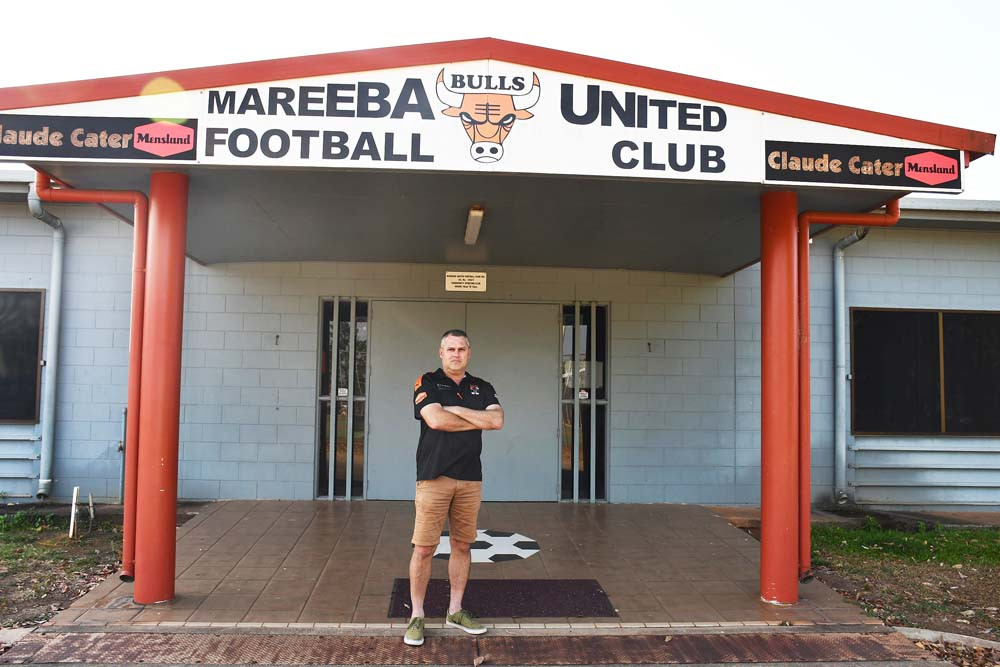Community & Business
19 November, 2024
Closure fears for club
IN A shock announcement last week, the Mareeba United Football Club warned it could shut down at its next members meeting if it cannot get the community support it needs to operate.

At its AGM last week, the six-strong executive were dismayed at the lack of attendance, with only seven other people showing up, one of whom was Mayor Angela Toppin, a regular volunteer.
With a lack of hands to take up vacant committee roles next year, the club, which has been running for more than 70 years, and which only two decades ago put Mareeba on the map as the “football capital of the north”, will close its doors and hand the keys back to the council.
“Each year that goes past, more people are scared to help because the less people volunteering, the more you get stuck helping more than you want to,” Club president Vince Tatti said.
“So then no one turns up because they’re worried they’ll be nominated. And it’s just a snowball effect. Everyone wants the club to keep going but no one wants to help because it is spread too thinly.”
Vince has been the president for the past year and while he’s been with the club as a player and helper for 30 years, he won’t be re-nominating.
“I’m a one-person-run business, and I have been shutting down 20 hours a week to do club work and I just can’t afford to do it,” he said.
“The season’s been over for a month and a half or more, but I’m still there everyday mowing, watering - there’s 10 acres of land to look after. You can’t just let it go.
“Me and another fella look after it. Everyone thinks that we just shut the doors and get three months off, but it’s not the case.”
The club has a six-member executive committee which includes the president, vice-president, secretary, treasurer, junior vice-president and registrar. Then there is a sub-committee that provides regular support for game days and day-to-day admin.
“It’s totally volunteer,” Vince said. “And those that do help are long-term supporters.”
But their numbers are dropping, despite the club’s proud history, tradition and community standing.
Since the 1950s, players, families and businesses have built the club on the back of a football-mad migrant community, who arrived in the region post-WWII and worked the tobacco farms of the time.
The club’s football legacy has seen the Mareeba Bulls win its fair share of premierships; produce world-class players who have represented teams in Europe and across Australia; take on the southern teams in the State League; and win the Crad Evans Cup in the north.
“If we sat down and counted how many people have come through, from juniors all the way through - thousands and thousands,” Vince said.
“At the moment we’ve got almost 200 registered juniors. Then you add the seniors, then multiply it by the 74 years of the club, it’s a lot of people.”
So why can’t the club draw on a clearly thriving football community? He suspects today’s fast-paced lifestyles, and multi-activity choices are adding to a lack of volunteers.
“But if you want your kids to play soccer, then you have to help,” he said bluntly.
The next meeting, on Monday 25 November, would be do or die. If people don’t attend, or offer some assistance, the club could be officially dissolved. The land and buildings go back to council, and all club monies are locked into a holding account overseen by council.
“The people that are there can’t just keep running it if no-one’s going to support them. Everyone says they don’t want it to come to this, but they’re drained. That’s it. Players will have to go to other clubs.”
There are solutions, but they needed people power, he said. Volunteering would be rostered, with monthly calendars, game day rosters, and delegated responsibilities for club maintenance. Ideally, the sub-committee would have between 10 to 20 members and individual teams would get more parent support.
“It just makes it so much easier. And it’s fun. Say if you get 4-6 people turning up on a weekend for a working bee, you just smash it.
“I’m hoping at this next meeting we get some people back, before it’s too late.”


